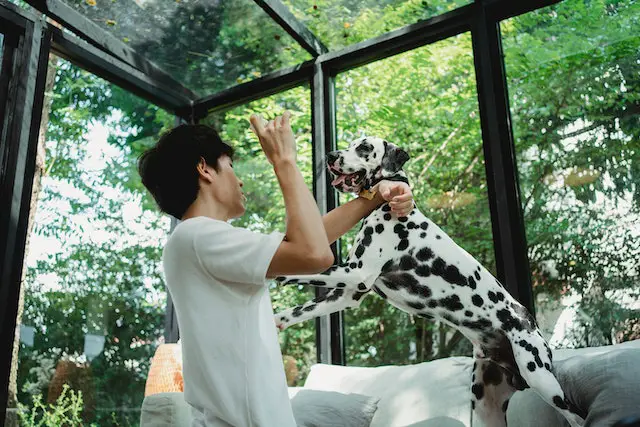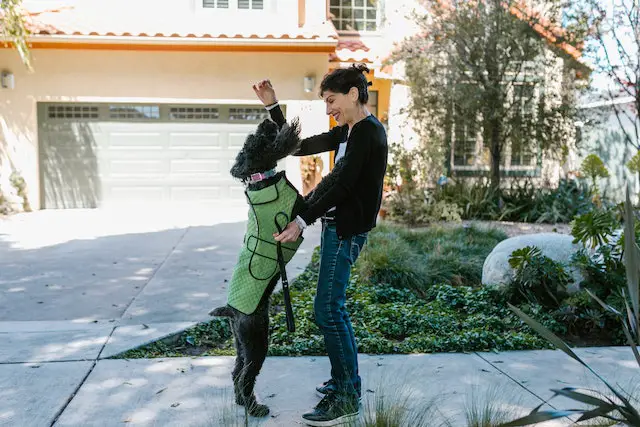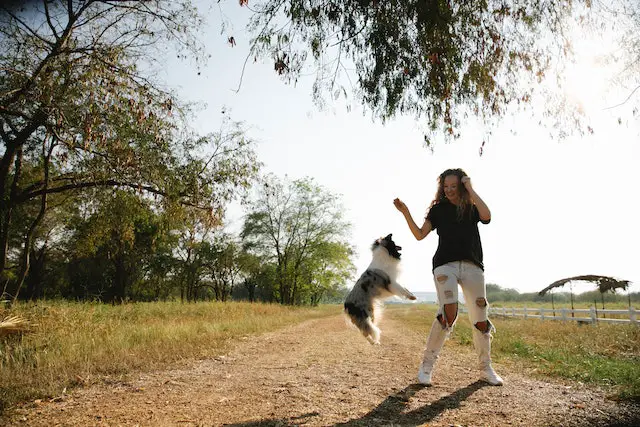Many dog owners and breeders alike spend a considerable amount of time watching their puppies learn the ropes.
A lot of training can be put into teaching your puppy to go outside, to come when called, and how to remain calm around other dogs. However, one skill that often takes a backseat is learning about discipline, such as keeping his or her mouth off people’s hands and bodies.
This is because many people wrongly assume that if their dog has been good about coming when called, going potty outdoors and not barking excessively then it will automatically know not to jump up on people. Unfortunately this is usually not the case!
Teaching a puppy boundaries early helps them properly embrace responsibility for their actions at an early age.

Behaviour experts have come up with a list of simple steps to teach your puppy how to stop jumping on people and biting
- Keep a collar, leash and a small scented item on the puppy at all times. This should be an item that has been worn or has touched you for a prolonged period of time.
- When someone comes over to your home, take the puppy through its regular commands such as sit and stay before greeting them so it is aware of this person’s presence.
- Stand straight and tall when someone approaches, or better yet ask them to give you their hand so the puppy can smell it.
- Do not let the puppy jump on people or they will learn that this is ok! Instead have them sit down so the dog knows all good things come from a sitting position.
- If your dog does jump up on you during play, turn your back to him or her and then walk away for a few minutes before restarting playtime.
- Keep in mind that if you reward this behaviour by petting him/her while they are jumping up then there is a good chance they will repeat it even longer next time!
- When eating, do not feed your dog from the table. This teaches it that people are a source of food and will gain better manners overall.
- Use a different word when you wish to get attention from your dog, such as ‘hey’ or ‘pssst’ rather than their name so they do not become confused all the time.
- Shoot for consistent behaviour – if your puppy is jumping up on you, give him/her a treat or two and then put them back in a sit position!
- If your dog bites at your feet while trying to play, either avoid putting them near each other altogether or have them wear mitts when playing so the harder biting does not injure either party!
- Give an ‘off’ command such as the word ‘stop’ instead of an attention seeking one such as ‘eh-eh’.
- If you have a friend that comes over frequently, ask them to help teach your dog how to be well behaved at all times using a hand signal or a different word when they wish to get its attention.
- Avoid having the puppy shut inside rooms if possible – this will only increase their energy and could lead to misbehaviour!
- Ensure your puppy gets lots of exercise before interacting with others as this is key to ensuring your dog remains calm as he/she matures!
- Keep windows closed whenever possible so that jumping up out onto windowsills is not an option.
- Keep your puppy calm while playing with its toys through the use of positive reinforcement, rather than simply throwing them around yourself or engaging in rough play.
- Never force your dog to interact with other people or dogs if he feels frightened by it – this will only increase their nervousness over time!
- Maintain a strong pack leader position by using assertive commands that are accompanied by body language whenever your dog starts being aggressive towards you or others.
- Reward good behaviour with small treats after successfully finishing a command, whether it be sitting before getting its leash on so walks do not become difficult, or learning how to stop biting humans through practicing ‘leave-it’ and other such exercises!
- If your puppy starts to become aggressive or dominant then teach them that humans are the leaders of the pack by using clear and concise commands that result in even more positive reinforcement when executed correctly.
- Avoid purchasing toys and other accessories for your dog if it is not used to interacting with them yet – this can lead to problems down the line!
- Always keep an eye out for warning signs such as growling before something regrettable happens, and ensure you do not let your pet get over excited (i.e. jumping up) while doing so!
- If someone reaches down to pet your pooch, encourage him/her to give a high value treat such as cheese or chicken instead so the dog learns to associate petting with something positive!
- Travel frequently with your puppy if you can, whether it be riding in a car or on an airplane so they learn to get comfortable being around all types of new situations!
- Acknowledge undesirable behaviour before instructing him/her not do it again! This will prevent confusion and frustration later on, leading to positive behavioural changes.
- Always have your dog wear mitts while playing – this way, their nails are kept short and their skin is protected from deep scratches that could lead to infection down the line.
- Make sure there are no small children in your household when training your pup as he/she may harm them by jumping up or biting while playing!
- Avoid having your puppy sleep inside at night until they have been fully trained to understand the rules of the house – this causes problems with chewing and other behavioural issues down the line!
- Never let your dog jump up onto furniture, for both hygienic and safety reasons.
- If you want a well-behaved pooch who understands how to behave in all situations, then you need to treat them like a canine-adult – not a human child!
- Do not allow anyone over if it is not convenient or if your pet is already behaving poorly towards humans as this will only serve to aggravate their current behaviour even more so than usual! 32. Do not let your dog get his/her way by leaping up on further items of furniture if they are already allowed to jump onto one, as this will lead to an increase in their behaviour over time!
- Keep your puppy entertained by giving them lots of toys and other interesting objects to look at or play with while you relax, but make sure they are safe before doing so – i.e. without little bits that might come loose and cause choking hazards later on!
- Exercise your pet’s mind through teaching them ‘trade’ and other such exercises where the dog is forced out of its comfort zone when interacting with humans or other dogs so it enjoys being around them more down the line!
- When you are playing with your dog, ensure that they do not become tired by running around too much so that he/she never loses focus on the task at hand!
- Never reprimand or punish your dog when it is in an aggressive mood since this will only serve to heighten its aggression down the line – try doing so when it is calm instead.
- If your pooch begins chewing something inappropriate before being trained properly then get them interested in their toys through showing them how fun play time can be!
- Allow for sufficient socialization with both humans and other dogs while training your pup to develop positive associations with all types of creatures, even though they may seem intimidating right now!
- As soon as your pet is comfortable with a person or another dog then enroll him/her in some sort of social or training service so they learn to interact with other creatures properly!
- Only allow children under the age of 12 to play with your puppy without supervision unless you know them well – this makes it much safer for everyone involved later on!

Conclusion:
Shower your pup with love, affection, and attention during their early life in order to prevent behavioural problems down the line. Always start training early so there is a better chance of eradicating bad habits! Never let your dog get its own way or jump up onto items of furniture, for multiple reasons including safety and cleanliness reasons! Always provide toys for your canine friend to play with so he/she doesn’t get bored often! The earlier you start training the better chance you have of eradicating bad habits. If your puppy begins chewing something inappropriate before being trained properly then get them interested in their toys through showing them how fun play time can be! Have lots of patience when dealing with dogs since it will make both your lives a whole lot easier in the future! Exercise your pet’s mind through teaching them ‘trade’ and other such exercises where the dog is forced out of its comfort zone when interacting with humans or other dogs so it enjoys being around them more down the line! Never reprimand or punish your dog when it is in an aggressive mood since this will only serve to heighten its aggression down the line – try doing so when it is calm instead! If you want a well-behaved pooch who understands how to behave in all situations, then you need to treat them like a canine-adult – not a human child! Do not allow anyone over if it is not convenient or if your pet is already behaving poorly towards humans as this will only serve to aggravate their current behaviour even more so than usual











What do you think?